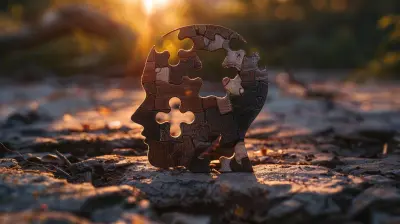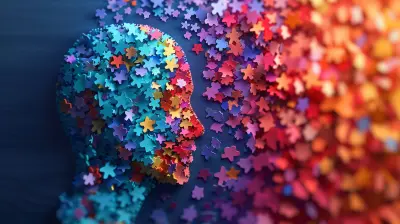How to Build Emotional Resilience and Avoid Becoming Dependent on Others
13 September 2025
Emotional resilience is the secret weapon that helps you bounce back from life's challenges while maintaining your sense of self. But let’s be honest—depending too much on others for emotional support can leave you feeling powerless.
So, how do you strike a balance? How do you build emotional resilience while avoiding emotional dependence? Let's dive in and break it down in a way that actually makes sense.

What Is Emotional Resilience?
Imagine life as a stormy sea. Emotional resilience is your ability to stay afloat, no matter how rough the waves get. It doesn’t mean you won’t feel pain, sadness, or frustration—it just means you can navigate those emotions without being completely overwhelmed.Psychologists define emotional resilience as the ability to adapt to stressful situations or crises. It’s what keeps you from falling apart when life throws a curveball your way.

Signs You Might Be Emotionally Dependent on Others
Before we talk about building resilience, let’s address emotional dependence. If you rely too much on others for emotional support, it can make you feel helpless and stuck. Here are some red flags to watch out for:- You constantly seek validation from others to feel good about yourself.
- You struggle to make decisions without reassurance.
- Other people’s opinions strongly influence your emotions.
- Being alone feels unbearable or terrifying.
- You panic when someone distances themselves from you emotionally.
Sound familiar? Don’t worry—becoming more emotionally resilient is totally possible.

How to Build Emotional Resilience and Regain Control
1. Strengthen Your Self-Awareness
The first step toward emotional resilience is understanding your emotions. When you're more self-aware, you stop looking to others to define how you feel.- Start journaling your emotions. Writing them down helps you see patterns and triggers.
- Practice mindfulness. Simply being present in the moment can help you process emotions in a healthier way.
- Ask yourself: "Why do I feel this way?" instead of immediately seeking reassurance from someone else.
2. Develop Healthy Coping Mechanisms
People who lack emotional resilience often turn to external sources like friends, family, or even unhealthy habits to cope. Instead, try these healthier strategies:- Deep breathing exercises - Slowing down your breath reduces anxiety and helps you regain control.
- Physical activity - Exercise releases endorphins, which naturally boost your mood.
- Creative outlets - Painting, writing, or playing music can be a great way to channel emotions.
3. Build a Strong Sense of Self-Worth
If you rely on others for confidence or validation, it’s time to shift that power back to yourself.- Stop seeking approval from others—your worth isn’t up for debate.
- Celebrate your small wins. Did you make it through a tough day? That’s a victory.
- Speak kindly to yourself. If you wouldn’t say it to a friend, don’t say it to yourself.
4. Cultivate Independence in Decision-Making
If you find yourself constantly looking to others for guidance, try this:- The next time you face a decision, take five minutes to think about it before asking someone else.
- Start with small decisions—what to eat, what to wear, what to watch—before tackling bigger ones.
- Trust your gut. Your instincts are stronger than you think.
5. Set Healthy Boundaries
Boundaries protect your emotional space. Without them, you can become overly reliant on others.- Learn to say no without guilt. Your needs matter too.
- Spend time alone without feeling the need to reach out constantly.
- Identify relationships that drain your emotional energy and take a step back when needed.
6. Accept That Discomfort Is Part of Growth
The truth? Resilience isn’t built in comfort zones. You have to embrace discomfort to grow stronger.- Sitting with your emotions instead of numbing them builds endurance.
- Facing challenges without immediately seeking help boosts confidence.
- Overcoming setbacks teaches you that you’re stronger than you think.
7. Build a Growth Mindset
A growth mindset helps you see setbacks as opportunities rather than failures.- Instead of thinking, “I can’t handle this,” try, “This is tough, but I’ll get through it.”
- Remind yourself of past hardships you’ve overcome—you’ve done it before, and you’ll do it again.
- Life isn’t about avoiding hardships; it’s about learning how to handle them.
8. Surround Yourself with Emotionally Healthy People
While it’s great to have a support system, it's important to choose people who encourage growth instead of fostering dependency.- Spend time with those who uplift and empower you.
- Avoid relationships where you feel pressured to constantly seek validation.
- Healthy friendships should feel like a two-way street, not an emotional crutch.
9. Prioritize Self-Care
Taking care of yourself isn't selfish—it's necessary for resilience.- Get enough sleep. A well-rested brain handles stress better.
- Eat well. A balanced diet affects your mental state more than you think.
- Unplug when needed. Digital detoxing can do wonders for emotional clarity.
10. Seek Professional Help When Needed
If emotional dependency is deeply affecting your life, talking to a therapist can help. Therapy provides tools and strategies to build resilience without relying too much on others.
Final Thoughts
Emotional resilience isn’t about shutting people out—it’s about standing strong on your own while still valuing your relationships. When you learn how to manage your emotions independently, you gain confidence, strength, and a deeper sense of self-worth.So, the next time life throws a storm your way, trust yourself to weather it. You've got this.
all images in this post were generated using AI tools
Category:
Emotional DependencyAuthor:

Gloria McVicar
Discussion
rate this article
1 comments
Sarah Larsen
This article provides valuable insights into fostering emotional resilience. By emphasizing self-awareness, emotional regulation, and healthy coping strategies, it encourages readers to cultivate independence while maintaining supportive relationships. A balanced approach to emotional health is essential for personal growth and well-being.
October 7, 2025 at 3:12 PM

Gloria McVicar
Thank you for your thoughtful comment! I'm glad you found the insights on emotional resilience and the importance of balance helpful.


